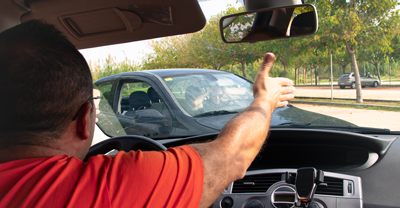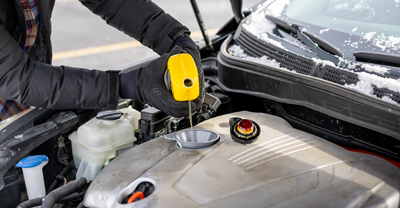Catalytic converter theft: Your questions answered
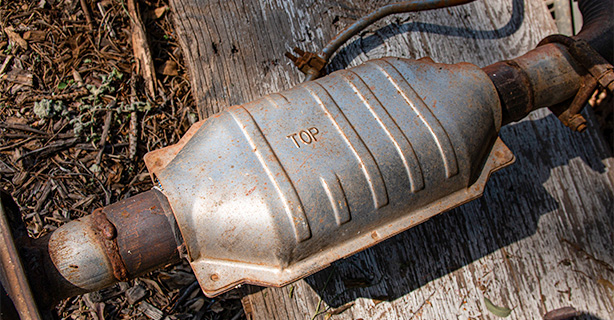
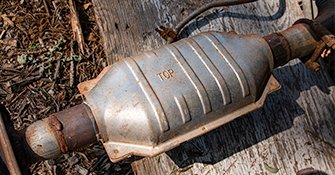
0 min. read
Catalytic converters are some of the most expensive car parts due to the precious metals inside them. Unfortunately, the valuable metals that make catalytic converters work also make them tempting to thieves—especially when they find vehicles whose owners haven't done anything to protect them.
According to the U.S. Department of Justice (USDOJ), 21 people were charged or arrested in November 2022 as part of a nationwide sting effort targeting catalytic converter thieves. These criminals made tens of millions of dollars before they were caught.
To reduce your risk of catalytic converter theft, you first need to understand what these car parts are and why thieves target them.
What is a catalytic converter?
All cars built since 1975 with a gas engine are required to have a catalytic converter. The device is part of a vehicle’s exhaust system and is designed to reduce the amount of harmful emissions each car produces.
While they vary by car manufacturer, catalytic converters are usually oblong, sometimes cylindrical, and look similar to a muffler.
Why are thieves stealing catalytic converters?
Thieves target catalytic converters for a few reasons:
These components can be easy to steal. Catalytic converter theft can be a relatively simple way for criminals to earn a lot of money—it usually only takes a couple minutes with a few tools.
Junkyards buy these devices as fast as thieves can get them. The precious metals inside a catalytic converter are in high demand on the black market. Once a thief has removed the component, they can often find a lineup of junkyards or scrap metal dealers waiting to make the purchase.
Precious metals are pulling in prices higher than ever. Supply chain problems have made the metals used in catalytic converters harder to source, which has driven up the current prices. This makes a quick, three-minute job under a car like a winning lottery ticket for thieves. Some of these metals pull better black-market prices than gold and silver. For example, the price of rhodium was nearly $20,000 per ounce at the beginning of 2022.
As of April 2023, per-ounce prices for these precious metals* were:
Platinum: $1,025
Palladium: $1,440
Rhodium: $6,900
Gold: $2,031
Criminals know these prices are high, and some may even steal your entire car to "part it out" and make more money.

Auto coverage can help protect you following an accident or theft.
How many catalytic converters have been stolen?
The National Insurance Crimes Bureau (NICB) tracks claims made to insurance agencies around the country. According to its most recent data for 2021, thefts of catalytic converters numbered over 52,000—up from a mere 1,298 just three years prior*.
An ABC News story places California and Texas first and second in the nation, respectively, for catalytic converter thefts. Between 2019 and August 2022, Californians made 7,430 claims of stolen converters. Texans weren't far behind with 4,830 claims in court at the time.
Several states have introduced legislation making it illegal to buy or sell stolen catalytic converters to help prevent thieves from profiting from the crime.
What happens to your car if the catalytic converter is stolen?
The moment you start your car, you’ll know if the catalytic converter has been stolen. Removing the catalytic converter leaves a hole in your exhaust system, so exhaust will escape before it gets to the muffler, making your car very loud.
Report the theft to your local police department as soon as you know it happened. Then, contact your car insurance provider to make sure the theft is covered under your policy, and submit a claim.
Can a car run without a catalytic converter?
Technically, yes—your car will start and run, and driving without a catalytic converter likely won’t damage the engine. We don’t recommend it, though, since it can reduce your car’s performance and efficiency and allow harmful gases to escape into the atmosphere. Plus, your car will be very loud, and it won’t pass inspection for vehicle registration. In that case, you won’t be allowed to register your car until you get it repaired.

Get your free car insurance quote today.
Should I replace my catalytic converter or get a new car?
If you have comprehensive car insurance and catalytic converter theft is covered under your policy, it’s a no-brainer: You can pay your deductible and get your car fixed. If insurance won’t cover the repairs, deciding whether to fix or replace your car comes down to cost. If repairs will cost more than your car is worth, it may be time to consider buying a different one.
How much does it cost to replace a catalytic converter?
The cost to repair your car after the catalytic converter is stolen will typically range from around $900 to more than $4,000.* The total price will vary based on a few factors:




How much is my car worth?
The value of your vehicle depends mostly on the year, make, model, mileage, and the condition it’s in. Inflation and supply chain constrictions have caused car prices to increase, so yours might be worth more than you think. An easy way to check is to visit a vehicle valuation website like Kelley Blue Book and enter your vehicle identification number (VIN), make and model, or license plate number.
If catalytic converter repairs, other repairs, and overdue maintenance will cost more than your car is worth, it could be time to cut your losses and get into a new-to-you vehicle. If you decide to get a newer car, check out the next section to help you choose wisely.
Which cars are most likely to have catalytic converters stolen?
Certain cars are common targets for catalytic converter theft. High-clearance vehicles, such as pickups and SUVs, have a higher chance of theft because accessing the catalytic converter is easier.
Hybrids are another prime target for catalytic converter theft for a few reasons:
Hybrids are typically newer than many other cars on the road, meaning the vehicles' parts are also newer.
Some hybrids don't process as much exhaust through the catalytic converter because a percentage of drive time is battery-only. Since these hybrids don’t use fuel all the time, their car catalytic converters are typically in better condition.
The catalytic converters on hybrids often contain more precious metals than those of older or non-hybrid vehicles, making them more valuable.
Does insurance cover stolen catalytic converters?
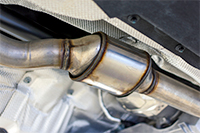
It depends on your insurance company and the type of auto insurance coverage you have on your car. Comprehensive coverage typically covers catalytic converter theft and might help cover the cost of replacing the component. Some policies might even cover the damage done to your vehicle when the thief removed the converter.
How do I protect my catalytic converter from thieves?
There are several steps you can take to help protect your vehicle from catalytic converter theft, including:
Park inside or in well-lit areas
Park your car inside if you have a garage. If not, park in a well-lit space or install bright outdoor lighting where you park to help thwart would-be thieves.
Leverage cameras
Security lights are great, but using security cameras (or at least park in an area you know has 24-hour surveillance) is even better. Capturing footage provides proof you can submit to authorities if a theft occurs.
Install a catalytic converter theft prevention device
A catalytic converter protector is usually a cage-type anti-theft device that covers your converter and makes it much more difficult for a thief to get to.
Mark your catalytic converter
Asking your trusted mechanic to engrave your vehicle's VIN on the catalytic converter helps in two ways: it proves the converter belongs to you and your vehicle, and it helps law enforcement trace ownership whenever catalytic converters are discovered, such as part of a sting operation.
Here are some other ideas to help you protect your vehicles' catalytic converters:

Park with your vehicle's exhaust pipe close to a fence or wall. This makes it more difficult for thieves to reach your catalytic converter.

Park vehicles with low clearance outside of higher ones. For example, park trucks next to a fence or wall, SUVs next, and cars on the outside.

Car alarms have varying sensitivity settings. Set your car alarm to a higher sensitivity setting to help deter thieves before they even start.
How do I get insurance to protect against catalytic converter theft?
Ask your insurance company if they provide coverage for theft, specifically catalytic converter theft and stolen parts replacement cost.
We're here when you need us. Contact us with any questions or to get a quote.








